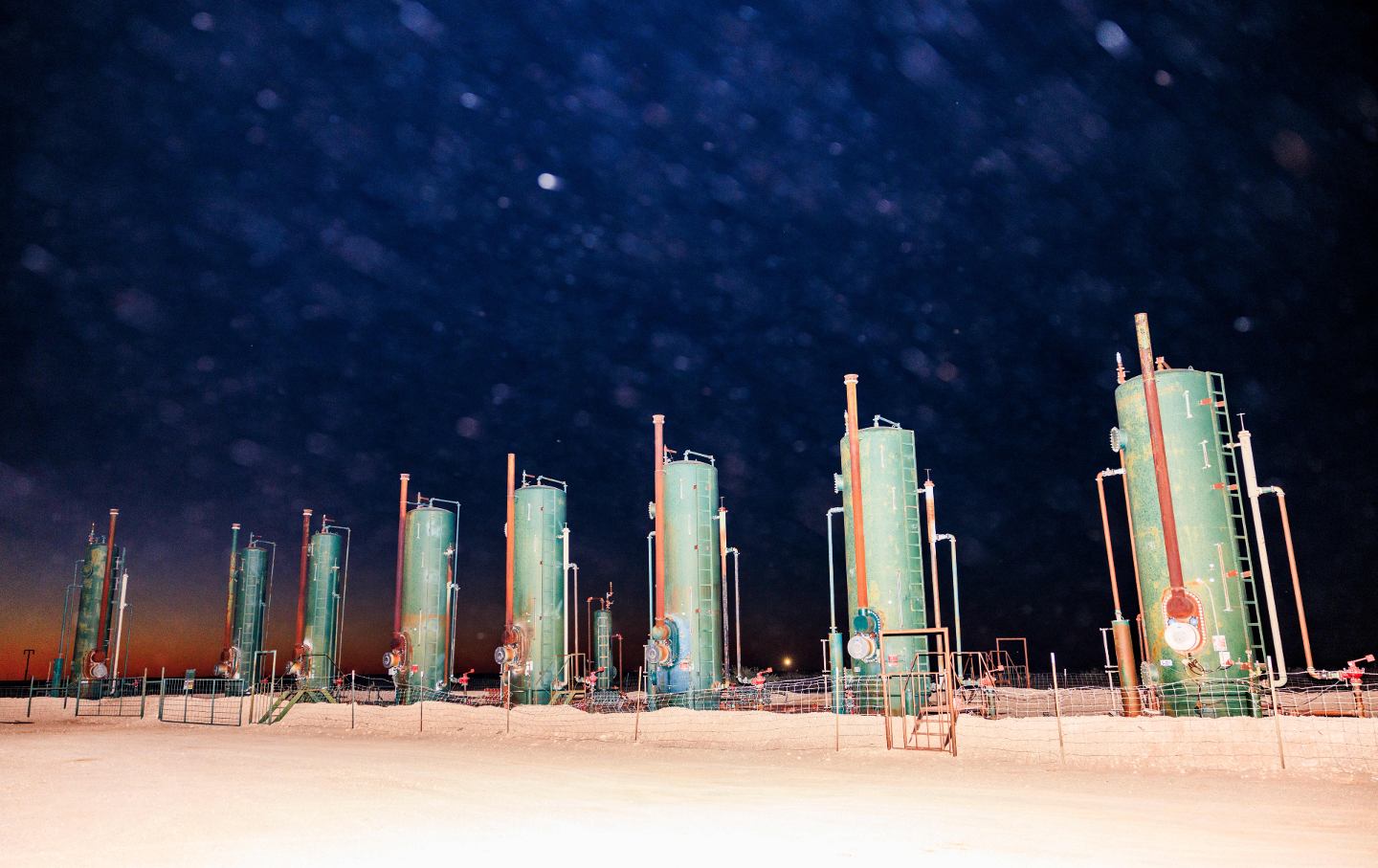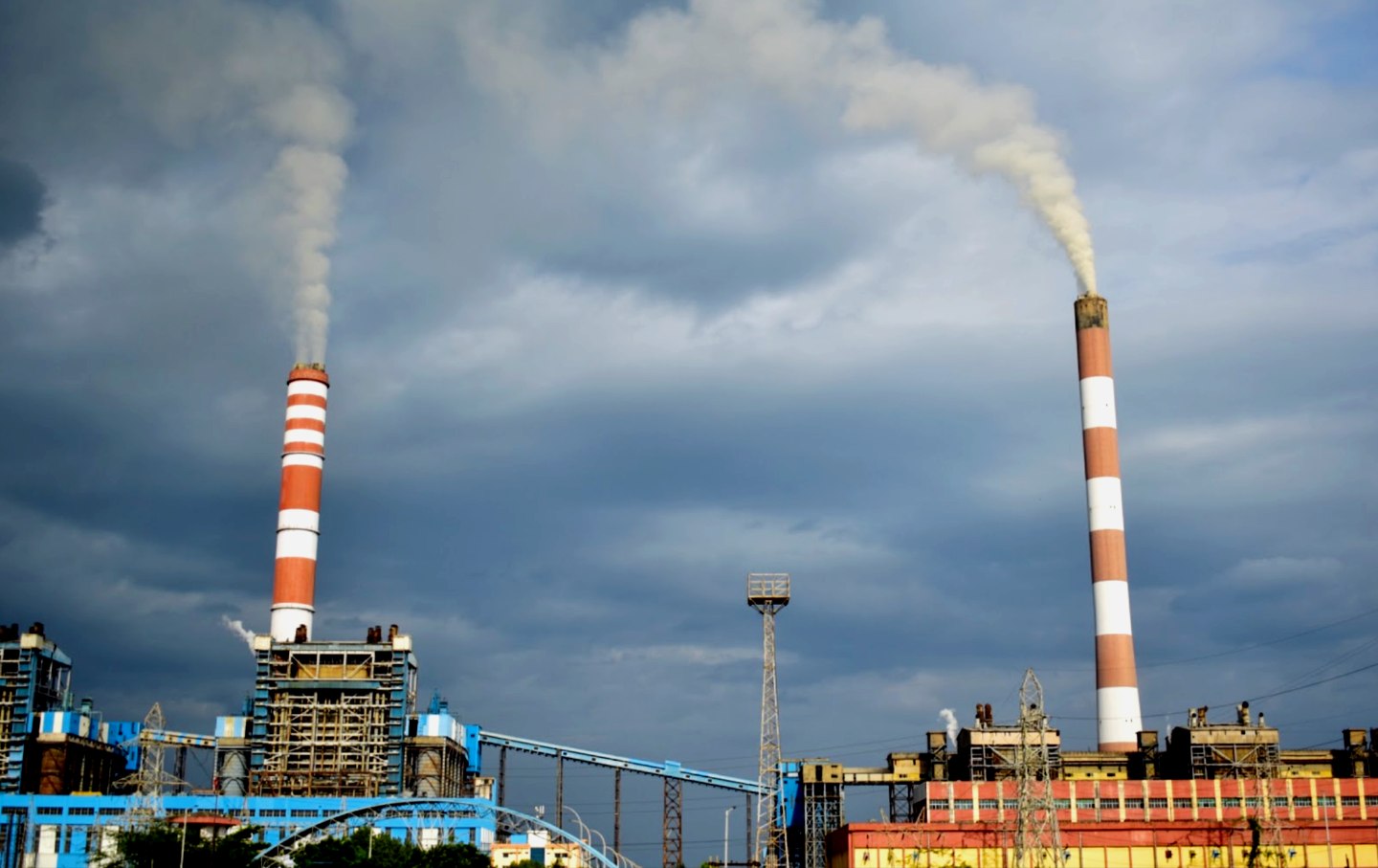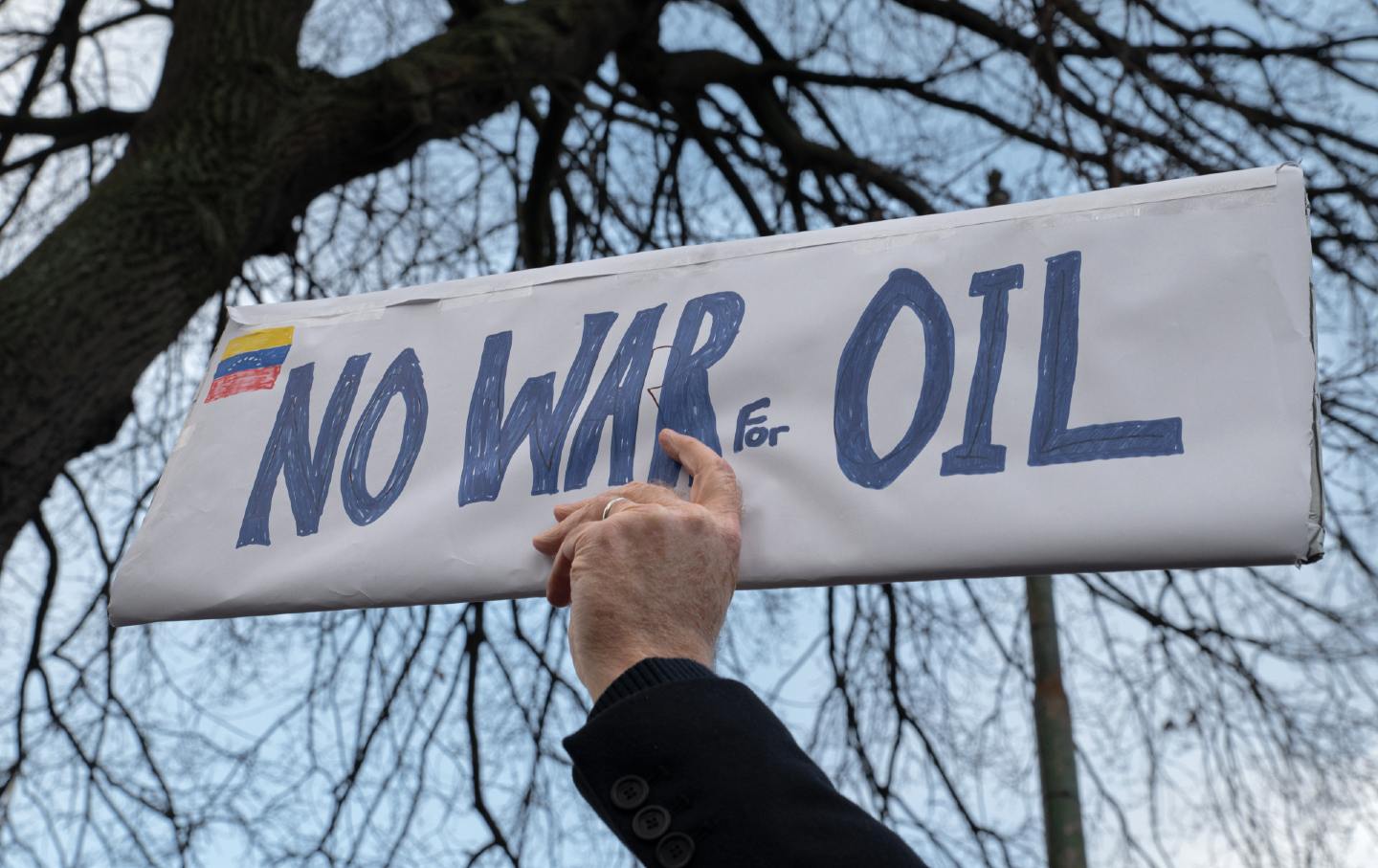In Exxon’s Orwellian World, Lower Emissions Means More Oil Production
In the corporation’s version of Newspeak, “carbon emissions” means whatever it wants—and any investment in renewables is just a facade.

In Exxon’s Orwellian World, Lower Emissions Means More Oil Production
In the corporation’s version of Newspeak, “carbon emmissions” means whatever it wants—and any investment in renewables is just a façade.
Which of the following is true?
ExxonMobil:
- pledges to eliminate its carbon emissions by 2050.
- is dramatically increasing its oil and gas production.
- invests vastly more capital in fossil fuel development than in carbon emission reduction.
If you answered “all of the above,” congratulations! You have mastered the Orwellian world of Big Oil climate-speak. This is a world where “carbon emissions” means whatever you want it to, where investing in climate solutions is a façade, and where global standards of living are forecasted to rise the hotter it gets.
ExxonMobil is not alone in practicing a 21st-century version of Newspeak, the logic-defying lingo of George Orwell’s iconic novel 1984. Most oil majors, while pledging to deal with carbon emissions, have no plans to move away from fossil fuels.
But Exxon is in a class by itself, and not only because it is the most valuable publicly traded energy company in the world. Exxon’s misleading climate pledges are business as usual for a company that strenuously denied climate change for years, contrary to its own scientists’ findings. They also fit nicely with Exxon’s current holier-than-thou advertising campaign promising that its expertise will help other industries lower carbon emissions.
The real-world Exxon is the company that just purchased shale oil producer Pioneer Natural Resources for $60 billion—its largest acquisition since it took over Mobil in 1999—thereby increasing its fossil fuel production by almost 20 percent in one leap. The Exxon of the world of 1984 is the company committed to achieve net zero carbon emissions by 2050, even while producing ever greater quantities of oil and gas.
How to reconcile the two?
The answer lies partly in the way Exxon defines emissions. In climate science, emissions are sorted into three buckets:
- Scope 1 are emissions from a company’s own operations, such as its factories, stores, and vehicles.
- Scope 2 are emissions from the production of electricity that a company purchases. Reducing this means buying (or generating) power from renewable sources like solar and wind.
- Scope 3 are emissions from the production of goods that companies buy from suppliers (“upstream”) and from customer use of products (“downstream”).
Popular
“swipe left below to view more authors”Swipe →In the fossil fuel industry, Scope 3 emissions account for about 90 percent of the total, as burning oil produces much more carbon than drilling for it. But Exxon’s net zero pledge is carefully worded to avoid any mention of Scope 3 emissions. Exxon is promising only to make its own operations carbon neutral, including buying electricity, or generating its own, from renewable sources.
Exxon apparently sees a future where the company’s drill rigs will run on clean solar power while pulling up ever more oil and gas, which will dump ever more carbon into the atmosphere when burned for fuel. This is what “net zero” means in Exxon language.
Exxon pretends to address the larger issue of emissions from its products by touting its investments in technological solutions like carbon capture and storage, hydrogen, and biofuels. But look closely at the numbers in its latest annual report: Exxon plans to spend an average of $2.8 billion annually in emissions reductions over the next six years, or just 12 percent of its total annual average capital budget of $22.5 billion. That means the company plans to invest seven times more capital in fossil fuels and their byproducts than on reducing emissions.
Inadequate as it is, Exxon’s low-carbon spending leads the pack, as oil majors overall only spend about 3 percent of their capital budgets on emissions reductions.
Exxon doesn’t hide its intention to expand its core fossil fuel business. “ExxonMobil is investing more money to grow oil and gas production than any other U.S. company,” it boasts. Prior to acquiring Pioneer, it had forecasted an increase in production from 3.7 million barrels per day to 4.2 million by 2027—a goal it has already eclipsed by the recent acquisition. Who knows where it will set its next target?
Exxon believes it is swimming with the tide, not against it. The company recognizes that carbon emissions will have to be cut more than two-thirds from their current rate of 37 gigatons annually to 11 gigatons by 2050 in order to limit global warming to 2° C (3.6 ° F)—the limit beyond which global catastrophe looms.
But Exxon simply believes this will not happen. In 2050, “oil and natural gas…will still be required to drive critically needed economic growth,” it predicts. Despite growth in renewable energy and carbon capture technologies, “oil and natural gas are still projected to meet more than half of the world’s energy needs by 2050.” Instead of falling to 11 gigatons annually, the oil giant believes emissions will be more than twice that: 24 gigatons. And a significant portion of that will come from Exxon itself.
Although Exxon no longer denies that climate change is real, it believes that weaning the world off oil would come at an unacceptably high price. In a filing earlier this year with the Securities and Exchange Commission, the company said, “It is highly unlikely that society would accept the degradation in global standard of living required to permanently achieve a scenario like the IEA NZE [the net zero emissions simulation of the International Energy Agency].”
Since we are heading off a climate cliff anyway, Exxon intends to enjoy the ride as long as it can. It plans to return $35 billion to shareholders in the form of share buybacks over the next two years, while doubling earnings and cashflow over the next four years.
To be fair to Exxon, eliminating its Scope 3 emissions would require shutting down fossil fuel production or investing hugely in technologies, still largely unproven, to capture and store the carbon released by burning oil and gas. A corporate strategic shift of that dimension would lead to a shareholder revolt.
The real reason to call out Exxon, and its brethren, is to recognize the simple truth that they will never pivot to low-carbon solutions so long as they can make more money from extracting and refining fossil fuel. As long as their current business model remains viable, they will pursue it relentlessly, and every gesture they make to lull public anxiety about impending climate disaster will be insubstantial. This is how free enterprise works.
The answer lies in restructuring the global trade in fossil fuels to put a price on carbon that fully reflects its environmental costs. Doing this, says a report from the International Monetary Fund, would bring carbon emissions down to a level that keeps the earth from undue warming.
Even Exxon itself acknowledges that regulation is the answer to unbridled fossil fuel production and consumption: “Billions of people need reliable, affordable energy every day. At the same time, that energy use is contributing to CO2 emissions…. Effective [government] policy frameworks will be critical to reduce global greenhouse gas emissions and meet society’s need for reliable and affordable energy.”
But instead of eliminating implicit fossil fuel subsidies, the IMF report says, countries are increasing them steadily. And without realistic carbon pricing, companies like Exxon, if they wish to survive in competitive markets, have no choice but to continue extracting and refining fossil fuels.
So perhaps instead of scorning Exxon as a rampaging destroyer, we should pity it as a blind giant, forced to keep digging society’s grave by the iron laws of unrestrained capitalism. And perhaps in the Orwellian distortions of Exxon’s statements we can discern a faint cry for help: “Stop us, while there is still time.”
More from The Nation

Want to Understand California’s Water Crisis? Look to the Pistachio. Want to Understand California’s Water Crisis? Look to the Pistachio.
A conversation with the documentarians Rowan Wernham and Yasha Levine about their film Pistachio Wars, a look at how one family came to control much of the state’s water.

Climate Hushers Need to Get Real Climate Hushers Need to Get Real
Political realism doesn’t outweigh scientific realism.

The US Needs India to Buy Coal. Who Pays the Cost? The US Needs India to Buy Coal. Who Pays the Cost?
As the country doubles down on coal exports, local communities—like those in Baltimore and Ennore—will bear the environmental burden.

The US Is a Violent Petro-State The US Is a Violent Petro-State
Trump’s attack on Venezuela illustrates fossil fuels’ many perils.

What Justice on a Burning Planet? What Justice on a Burning Planet?
Andreas Malm and Thea Riofrancos joined The Nation’s Wen Stephenson in an urgent conversation about the left and the climate emergency.
Q&A / Wen Stephenson, Andreas Malm, and Thea Riofrancos

The Fight for the Last Wild Salmon The Fight for the Last Wild Salmon
In Alaska, the last stronghold for wild salmon, Native tribes and conservationists are working to save the fish from both climate change and decades of corporate greed.


